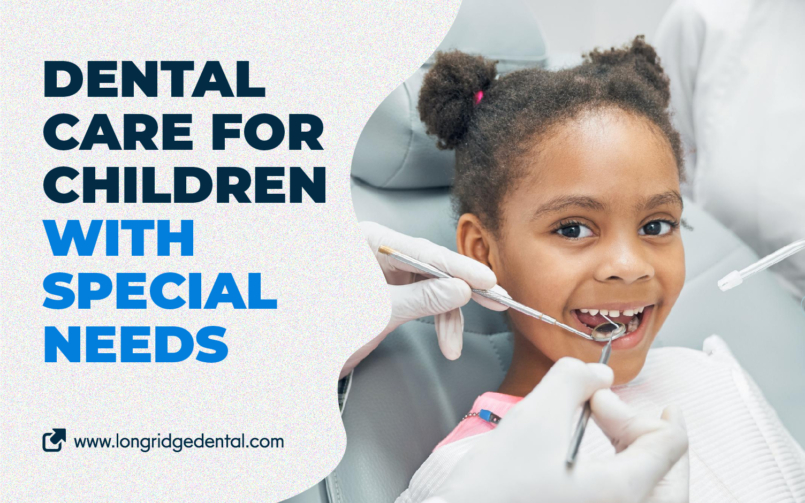
Dental Care for Children with Special Needs
Parents may find it demanding to supervise their kids with special needs. Based on the National Survey of Children’s Health in 2017–2018, 13.6 million kids in the US require special assistance. Any physical, cognitive, social, intellectual, or emotional deficits in these kids may call for medical attention. Typical daily tasks, such as performing oral health regimens, are challenging for them. Due to ignorance, over-caring, or a concentration on more immediate medical issues, such parents overlook their children’s dental health. These elements raise the child’s lifelong chance of getting oral disorders.
What oral conditions are frequently seen in kids with special needs?
Parents must be aware of the following oral issues in kids with special needs:
Enamel hypoplasia: This is a condition where the enamel on the tooth’s outer surface is sparse or absent (particularly in the upper front teeth or the molars). Pits, fissures, and enamel chips are present with white patches or yellow or brown staining on the teeth. Children with behavioral delays, genetic disorders, or are underweight at birth are more likely to experience enamel hypoplasia.
Dental flaws: During the formation of their teeth, kids with special needs are more likely to experience dental imperfections. Consequently, the shape, size, and quantity of molars or archways can vary. Some kids, particularly those with Down syndrome or other genetic defects, may have delayed tooth emergence. These differences hamper children’s duties and attractiveness.
Misaligned Teeth: Children suffering from mental illnesses, cerebral palsy (abnormal muscular tone), or other facial anomalies may have misplaced or overcrowded teeth. Tooth crowding, a wide bite (where the upper and lower teeth cannot touch), a crossbite (where the upper teeth fit within the lower teeth), or tooth gap are the effects of this.
Gum illnesses: Children with special needs frequently get gum diseases due to inadequate dental hygiene or misaligned teeth that make it difficult to brush teeth effectively. Most children with special needs use drugs to control seizures, and gum expansion is one of these adverse effects.
Trauma: Kids with special needs frequently have seizures, experience developmental delays, have poor motor coordination, and have atypical reflexes. Frequent falls brought on by these diseases can harm facial and oral features.
How to Develop a Regular Dental Care Schedule for Children with Special Needs
Now that you know the variety of oral conditions found in children with special needs, it is essential to develop a schedule for them so you can avoid these conditions to some extent. Kids with unique needs require more attention and devotion when receiving pediatric dental treatment, but it doesn’t have to be complicated. You can assist your child in taking excellent care of their teeth both now and in the coming time with a bit of forethought and preparation.
Make a Regular Schedule
Establishing a regular schedule right away is crucial if you want to guarantee your child’s oral health success. Establish a routine for cleaning and flossing your teeth every morning and every evening (after sugary snacks). Never miss a day because even skipping one lesson might slow your child’s progress. But we’re confident your kid will learn to hold onto the top spot with practice and persistence.
Take Your Time
Children with unique needs require more time and effort when receiving dental care. For instance, sensory stimulation overwhelms children with autism frequently, making brushing and flossing quite tricky (and uncomfortable). Introduce the technique gradually by first brushing your kid’s lips or the interior of their mouth with a toothbrush. This will facilitate their adaptation to the sensation in a non-intrusive approach.
Floss and Brush Together
Incorporating dental care into a household activity will help your child become enthusiastic about dental health once they are confident using a toothbrush. When you clean and floss with your child, you may monitor their advancement and demonstrate good oral hygiene to them. Since children enjoy imitating their parents, make the most of this tendency by allowing your child to practice good dental hygiene.
Choose a Dentist with Expertise in Treating Kids with Special Needs
Taking care of the oral needs of kids with special needs requires unique training and equipment that not every dentist possesses. Special needs kids need particular care and consideration since some problems can hinder your child’s oral growth or facility more challenging and time-consuming.
At Long Ridge Dental, We perform our treatments in front of you so that you can directly see how dentists deal with kids with special needs. During your initial appointment, we will discuss your child’s general dental health, especially development and growth. You can ask about necessary dental procedures for the future and address any further queries you may have during our last appointment.
You must be logged in to post a comment.